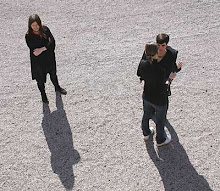Thursday, August 14, 2008
On "pseudo modernism" - or the places that venture capital blogs can take you
I'm still putting my "how to make a creative business work" blog together - bit by bit. It's taking a while because I feel that I need to work out the focus and form I want. I'm like this when I write books too - it takes me ages to get the structure all mapped out and then filling in the details of content is quite fast.
I also can't get the banner right - true pathos yes?
Anyway, I was considering whether to put a sidebar link to this New York venture capital blog by Fred Wilson:
http://avc.blogs.com/
It's good stuff, although ironically one of the things I want to say myself is that the assumption that investment from outsiders is a good thing is very questionable. It became fashionable in the dot-com era and now it's far too often taken for granted and the desire - if not the actuality - of "big investment" probably wrecks more businesses than it helps. More on that in the new blog.
Reading the avc blog, I found a discussion of the new "psuedo modernism" - now who would have thought it?
Anyway, as you know, I totally bore anyone reading this blog from time to time by going off on a monologue about where design is headed. I that context, this is worth a read, though it is awfully self-consciously academic in a way that reminds me of why I left academia. It's not that I don't respect this way of writing - just that I found it a bit stifling myself and when I took to putting flip-book corners on my thesis I realised that maybe I was more cut-out for something else. This article would benefit from flip-book corners I think. As would my blog of course - if I could work out how to do them.
____________
What’s Post Postmodernism?
I believe there is more to this shift than a simple change in cultural fashion. The terms by which authority, knowledge, selfhood, reality and time are conceived have been altered, suddenly and forever. There is now a gulf between most lecturers and their students akin to the one which appeared in the late 1960s, but not for the same kind of reason. The shift from modernism to postmodernism did not stem from any profound reformulation in the conditions of cultural production and reception; all that happened, to rhetorically exaggerate, was that the kind of people who had once written Ulysses and To the Lighthouse wrote Pale Fire and The Bloody Chamber instead. But somewhere in the late 1990s or early 2000s, the emergence of new technologies re-structured, violently and forever, the nature of the author, the reader and the text, and the relationships between them.
http://www.philosophynow.org/issue58/58kirby.htm
Subscribe to:
Post Comments (Atom)

No comments:
Post a Comment